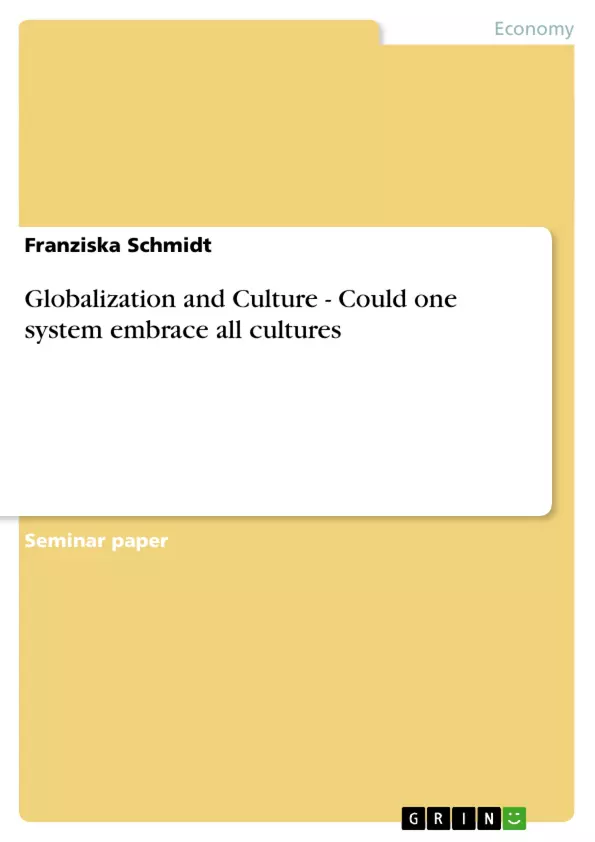The paper “Globalization and Culture” deals with the question of whether it is possible for one system to embrace all cultures. Globalization is the development towards an integrated world system embracing all main schools of thought across all levels of society. The main proponents of this development are technological and institutional advancements. After looking at the main stepping stones in the historical development of globalization a definition of culture is given. Culture is seen as an agreement between people belonging to a group and concerns the meaning of certain actions. Cultures consists of attitudes, beliefs and values. Their elements differ between families, companies and nations. Although these differences exist, there is a tendency towards cultural homogenization caused by globalization. The paper discusses whether it is possible that one system could work for all. It outlines that deep cultural differences still exist. International organizations and national governments have made attempts to save local cultures showing how important it is to protect them. In conclusion it is stressed that it is more important to work on a global acceptance and awareness of other cultures than on creating a global village with a global culture.
Inhaltsverzeichnis (Table of Contents)
- 1 Introduction
- 2 What is Globalization?
- 3 The Dynamics of Globalization
- 4 The History of Global Expansion
- 4.1 The pre-modern (before 1500)
- 4.2 The early modern (1500-1850)
- 4.3 Modern Globalization (1850-1945)
- 4.4 Contemporary Globalization
- 5 Globalization and Culture
- 5.1 A definition of culture
- 5.2 How cultures differ
- 5.3 Cultural Homogenization
Zielsetzung und Themenschwerpunkte (Objectives and Key Themes)
The paper “Globalization and Culture” examines the feasibility of a single system encompassing all cultures. It explores globalization as a process integrating the world system, encompassing diverse schools of thought across various societal levels. Technological and institutional advancements are identified as key drivers of this integration. The paper delves into the historical development of globalization, defines culture as a shared understanding of actions, and examines the impact of globalization on cultural homogenization. It aims to determine if a single system could work for all cultures.
- Globalization as an integrated world system
- The historical development of globalization
- Definition and elements of culture
- Cultural homogenization
- The possibility of a single system for all cultures
Zusammenfassung der Kapitel (Chapter Summaries)
The introductory chapter presents the paper's focus on the question of a single cultural system within a globalized world. It highlights the increasing interconnectedness of nations and the role of globalization in cultural change, referencing the World Commission on Culture and Development (WCCD) report "Our Creative Diversity."
Chapter 2 defines globalization as a shift towards an integrated world system, discussing its impact across politics, economics, culture, sociology, and daily life. The chapter analyzes globalization at three levels: individual, contractual governance, and institutional. At the individual level, it examines the impact of media and travel on global perspectives, while at the contractual governance level, it explores the rise of global production and the internationalization of economic activities. The institutional level focuses on the historical tendency of powerful nations to expand across borders for political and economic gain, leading to contemporary alliances and unions that foster global trade.
Schlüsselwörter (Keywords)
This paper revolves around the concepts of globalization and culture. It examines the development of a global system and its impact on cultural diversity. Key topics include historical phases of globalization, cultural differences, and the potential for a single system to embrace all cultures.
Can one global system embrace all cultures?
The paper concludes that while globalization trends toward homogenization, deep cultural differences still exist, making it more important to work on global acceptance rather than a single unified culture.
What is cultural homogenization?
It is the tendency of cultures to become more similar due to the global exchange of media, travel, and economic integration, often leading to the loss of local traditions.
How is culture defined in the context of globalization?
Culture is seen as an agreement between group members concerning the meaning of actions, consisting of shared attitudes, beliefs, and values across families, companies, and nations.
What are the main drivers of globalization?
Technological advancements (like the internet) and institutional developments (like international trade alliances) are the primary proponents of global integration.
Why is it important to protect local cultures?
Protecting local cultures preserves diversity and identity, which is why international organizations and national governments make efforts to save them from being completely absorbed by a "global village."



